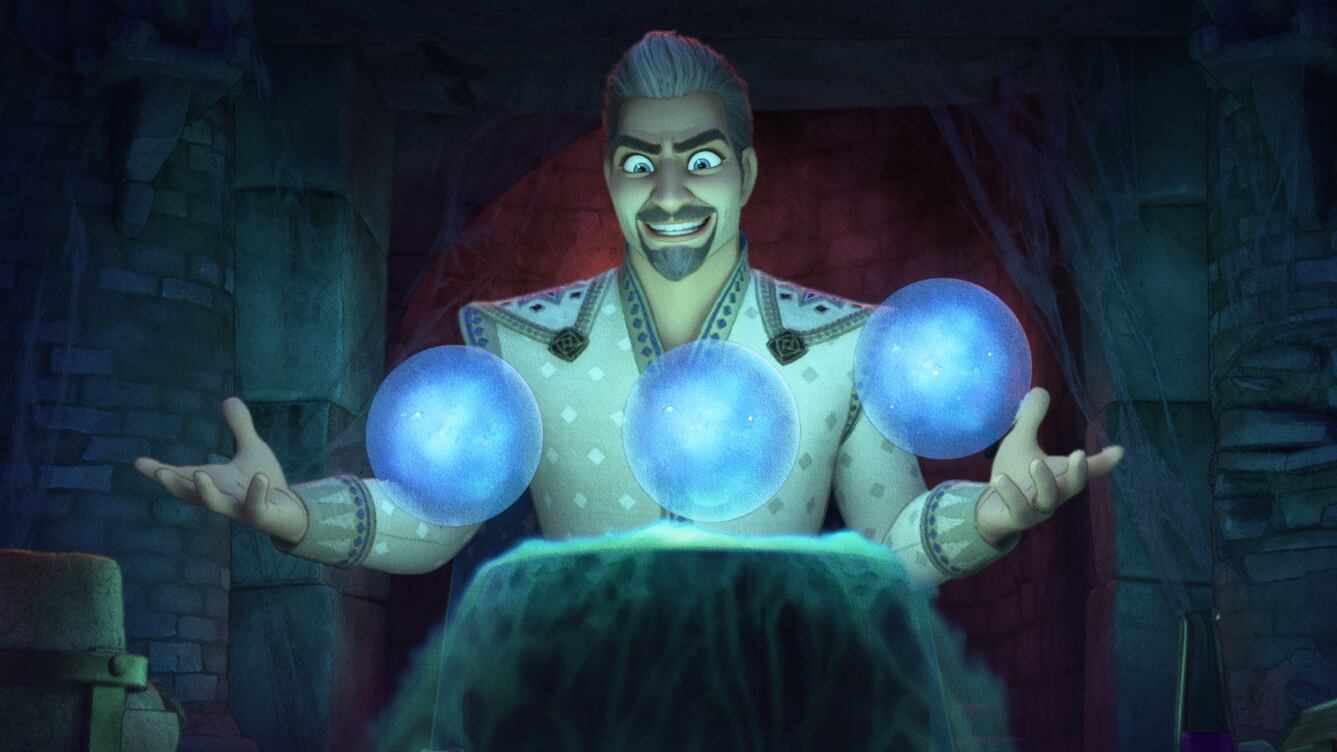Wish, as its ad campaign is quick to remind us, is a celebration of Disney’s 100th anniversary, complete with declaring itself an origin story for the Star of “When You Wish Upon a…” fame.
In that spirit, the film deliberately hearkens back to the studio’s past animated triumphs—and not just through its art style, which evokes (to varying degrees of success) the fluid watercolors of Disney’s 2D era through computer animation. After a number of films where a clear-cut antagonist is only revealed in the third act if one even exists at all (consider Encanto, where the real villain is generational trauma), Wish returns to a more classic Disney villain mode. King Magnifico (Chris Pine), the wish-granting ruler of the kingdom of Rosas, spends roughly a scene and a half as a benevolent tyrant before he’s revealed to be, well, a non-benevolent tyrant—with all the gloating, cape swishing, and evil laughter that comes with the territory.
There’s even, at long last, a new villain song! Much like the Disney villain itself, the villain song has been put on the backburner in recent years; there hasn’t been a proper one since 2009’s The Princess and the Frog, which featured Doc Facilier’s sinister bop “Friends on the Other Side”. (Tangled technically had one a year later, with Mother Gothel’s “Mother Knows Best”, but it was sung well before the character showed her true colors.) In theory, a celebration of Disney’s centennial is the perfect opportunity to whip out a wicked banger. The history of Disney has been written by its villains as much as by its heroes and princesses, and the songs they sing—Ursula vamping her way through “Poor Unfortunate Souls”, Scar ordering an army of goose-stepping hyenas to “Be Prepared”, the Devil and God raging inside the soul of Judge Frollo in “Hellfire”—are vital parts of their iconography.
But alas, there is nothing iconic or vital about King Magnifico’s villain song. It’s called “This Is the Thanks I Get?!” (interrobang included), and it signals a major turning point in the story. Before he sings the song, Magnifico is a selfish and egotistical ruler, but not yet completely evil: the influence of his wife, Queen Amaya (Angelique Cabral), keeps him from opening a book of forbidden magic. After the song, in which he puffs up his own ego and seethes over the subjects who dare question him, Magnifico has fully embraced the dark side, drunk with power as green magic (as always, the color of Evil Magic) swirls around his cackling silhouette. There will be no going back.
It’s a scenario ripe with dramatic potential, and it’s one which “The Thanks I Get” imbues with all the intensity and gravitas of a slow day in an H&M fitting room. Chris Pine does the best he can with the material, alternating between preening and growling as necessary, but he’s done no favors with blandly peppy pop instrumentation that sounds like royalty-free background music for a Kohl’s commercial, replete with cheerful acoustic guitars and dippy background vocals.
There have been lighthearted villain songs before, but “The Thanks I Get” is no “Gaston”. Not only is it not funny (the wicked king sneering “ungrateful much?” and declaring, apropos of nothing, that he got his good looks from “outer space” is what passes for humor here), but the relentlessly wordy patter of the lyrics is disorganized, ungainly, and frustratingly unmemorable: If they do a sing-along showing of Wish, the audience is going to sound like a drunk guy trying to get through “It’s The End of the World As We Know It” at karaoke. It is, in short, a baffling misfire that completely deadens the dramatic impact of a pivotal moment in the film.
How did it come to this? Some have blamed Lin-Manuel Miranda, and several of Wish’s songs—“The Thanks I Get” included—do seem like conscious attempts to recapture some of that Encanto magic, mostly by imitating Miranda’s habit of cramming as many syllables into each line as humanly possible. But while Miranda’s unflagging theater-kid energy can be tiresome, it does make him uniquely suited for a Disney musical. “We Don’t Talk About Bruno” may be catchy, as millions of enthralled children and their parents teetering on the brink of insanity can attest, but it’s a musical ensemble number first and a pop song second. By contrast, every song from Wish feels like a pop song, even the ensemble numbers.

There’s a reason for Wish’s pop sheen. While Disney usually works with composers and songwriters well-versed in musical theater, like Alan Menken or Robert Lopez, the soundtrack for Wish was written by a pair of pop songwriters: Julia Michaels, best known for her song “Issues” as well as collaborations with Justin Bieber and Selena Gomez, and Benjamin Rice, who is mostly a behind-the-scenes guy.
Accordingly, while these new songs have some decent melodies (“This Wish”, “At All Costs”), they’re trapped under a layer of radio-friendly shrinkwrap. None of the classic Disney songs are necessarily “timeless”—if you listened to, say, “Circle of Life” and “Let It Go”, you could probably guess which song was written 20 years after the other one—but they have universal appeal because of their undeniable craft and a sense of sing-for-the-back-row theatricality. The songs of Wish approximate the style in fits and starts, but it’s never more than pastiche; where past Disney songs were larger than life, these songs don’t even seem larger than the screen.
Sometimes, a wish is an act of synecdoche, a stand-in for a deeper yearning. When someone says they want to go back to the ’90s, they’re not necessarily longing for Pogs and dial-up internet, but for a period of relative global stability and economic prosperity. Disney would do well to keep this in mind as they plan out their next 100 years. Fans have clamored for a new Disney villain with a song to match, but those are just means to an end: What they’re really after is a feeling. They want to feel the way they felt when they saw Maleficent turn into a dragon for the first time; they want to laugh and marvel the way they laughed and marveled at Hades or Yzma; they want a song as memorable and striking as “Poor Unfortunate Souls” or “Hellfire”.
That’s not something Disney will achieve by chasing trends or asking a couple of industry songwriters to give them another “Bruno;” it can only be achieved by giving bold, ambitious creatives the resources and latitude they need to realize their visions. From there, a new path will unfold—hopefully one that leads far away from Chris Pine rapping.






